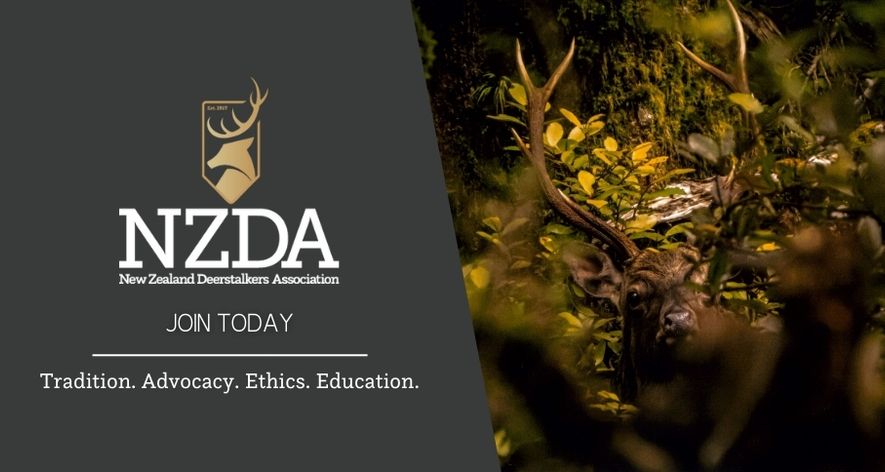STARING DOWN THE BARREL OF FIREARMS FEE REFORMS
6 September 2023
Hunting and Wildlife Magazine - Autumn Issue 220
Words By: William Ferris
The most recent in the bout of firearms reforms by Police has been the Arms Act Fee Review process, public consultation for which closed on the 2nd of March. The process and substance of the proposals raised a number of concerns that the firearms owning community and general public should be aware of. Over the summer I worked alongside Gwyn Thurlow, CEO and General Counsel, as we tried to work through these concerns with Police through engagement with the Firearms Community Advisory Forum, conducting a membership survey, and through raising our concerns with relevant politicians across the benches, and government officials.
In this article I summarise some of the key concerns we identified during our work over the past few months. These concerns are shared by the majority of NZDA members and have been raised by other groups in the hunting and shooting community outside of the NZDA, suggesting they likely represent the views of the majority of licenced owners generally.
At the end of the day, and as our data shows, the firearms community as well as the public as a whole want a safe, secure and well-managed firearms regulatory system. The vast majority of people support safety training, strong vetting and an effective licensing system. However, a number of obstacles to achieving those outcomes have arisen as a result of some reforms.
Arms Act fees needed reviewing for some time. The Law and Order select committee identified in 2017 that fees were inadequate given the costs of administration. It is not the fact of review that is the issue, nor is it the fact of increased fees. Concerns centre on the likely impacts of significantly increased fees on a range of outcomes including public safety, conservation and access to recreation opportunities. They also focus on the procedural failures of Police. One of the pillars of good policing is ensuring public trust in the efficacy and integrity of their systems.
We only need to look at the principles listed in the Policing Act 2008 to see this:
“This Act is based on the following principles:
- principled, effective, and efficient policing services are a cornerstone of a free and democratic society under the rule of law:
- effective policing relies on a wide measure of public support and confidence:”
The methods used by Police to communicate with the community, their accounting standards and their engagement with stakeholders has been underwhelming in this case. The community as a whole requires substantially more principled, effective and efficient engagement in order to maintain public support and confidence.
What are Police proposing?
Current Context
All firearms users must be licenced by Police.
Currently, holders of a standard firearms licence must pay $126.50 when they first apply for a licence and this remains valid for 5 years. Subsequently they must pay a renewal fee of $126.50 if they wish to renew their licence (so long as they apply before their previous one expired) or $241.50 if they apply after it has expired. A renewed licenced remains valid for 10 years.
All licenced firearms owners and the people they live with must be vetted by Police and their home must be inspected before they can be issued a licence. All applicants must also attend a mandatory safety training course and pass a test on the Arms Code.
Police’s Proposals
The current fee system needs to be updated but the question is to what cost?
Police have recognised that there is a public interest in having a well-functioning firearms regulatory system. The criteria they have used are:
- Promotion of public safety
- Controlled use of firearms and ammunition
- Equity (between licence holders)
- Practicality
- Efficiency
- Cost effectiveness
Police state that they have calculated that the cost of issuing a standard 10-year firearms licence is between $960-$1,060 per applicant and for a first-time 5-year licence it is $793-875. Police did not release how these numbers were calculated and whether there are significant variations in cost depending on various factors such as location. Unfortunately, this was a major obstacle to providing comprehensive feedback on their proposals.
Police propose three potential options, either a 75%, 50% or 25% cost recovery:

It is noteworthy that the safety course would not be included in this price and would be an additional $88.
Police stated that they favour either option 50% or 75% cost recovery on the basis that they “better reflect that the possession and use of a firearm is a privilege” and that “the beneficiaries meet the cost of delivering the licensing services. At 50% (Option B) it reflects a cost increase of 231% for first-time applicants and 285% for subsequent applicants. Option C (75%) reflects a cost increase of 397% for first-time applicants and 477% for subsequent applicants.
In addition, Police have proposed a number of new or significantly increased fees for almost every aspect of the Arms regulatory system. These include major increases to costs for non-profits that run museums or other matters.
Why should you be concerned?
The proposed fee increases will have a detrimental impact on recreational hunters and shooters, who are already facing financial hardship due to the on-going cost of living crisis, and will have significant ripple effects throughout our communities including on general public safety. While these concerns have been raised with relevant decision-makers, the key challenge is ensuring that the community is aware of the risks that are involved with the proposed reforms.
Impact on Public Safety, Conservation and Recreation Outcomes
A survey of over 2,500 people that I ran in January 2023 uncovered many of the negative outcomes that we may see as a result of Police’s proposals.
The impact on game animal management will be drastic. With hunters currently taking approximately 300,000 deer, up to 1 million goats and millions of pest animal per year, high fees will lead to significant increases in the populations of wild animals throughout the country. Highest estimates are that up to 180,000 fewer deer will be taken per year if all of Police’s proposals are accepted. That difference will have to be met by public agencies such as DOC, LINZ and Councils.
Public safety is also a major concern. The ground-breaking report by Justice Thorp in 1997 said “if this new system is to succeed it will be essential that an adequate level of compliance is achieved – and 90 percent should be the minimum target.” Ever since that report, it has been generally understood that Police should aim for that level of high compliance. The proposed fees contradict that recommendation and will likely push some young persons and those from lower-income households towards grey market ownership – a huge public safety loss.
Lastly, the impact on sport and recreation cannot be ignored. Hunting and shooting sports are one of the few major New Zealand recreational pursuits that receive almost no general public funding. Not only that, but there is substantial red-tape and fees involved with running hunting and shooting sports unlike many others. Additional licence fees, and notably the costs that Police propose for importing firearms and ammunition and for traveling to New Zealand on a visitors licence have the potential of destroying shooting sports in New Zealand. It will become unaffordable for amateur sportspersons to participate in overseas competitions and for foreign athletes or visitors to come and enjoy New Zealand’s sporting opportunities.
Failure to make data-backed proposals
Police have failed to listen to expert advice from throughout the firearms owning community, affected industries and from those that will be directly affected by the reforms. It is not only common-instinct but our data shows that if fees increase dramatically, there will be a drop in firearms ownership as well as compliance with regulations (up to a 60% drop if the highest fees are implemented). This seems self-evident, but what matters most is understanding the threshold for where fees will lead to significantly detrimental public safety outcomes (as well as other negative impacts). That threshold is approximately $300 per licence application, which compared with proposals for fees of $485 or $727.50 shows that Police have not properly considered the impacts of their proposal (see figure 2).

Possible solutions to the challenges
The critical solution is for Police to take a step back from their timeline and undertake comprehensive community sensitivity analysis to assess the impacts of their proposal on different groups, in different locations and to assess whether their processes align with best practice recommendations by the Treasury and Office of the Auditor General.
It is clear, and almost everyone in the community agrees, that the Arms Act fees need to be updated and reviewed to reflect the realities faced by the community in 2023 as opposed to 1999 when they were last set.
There have been significant changes to the regulation system and to what the public expects of the regulation system. On top of that, there has been price inflation in the past 24 years. However, taking into account inflation alone results in a fee of approximately $222.92 based on Reserve Bank figures.
Before Police can accurately calculate the total net-cost of a single firearms licence or other service provided under the Arms Act, they need to obtain sufficient data to do a comprehensive cost-benefit analysis looking at relevant externalities including most importantly public safety, conservation and biodiversity, and compliance outcomes.
NZDA has undertaken community-sensitivity analysis and can confidently state that the firearms owning community and willing and able to afford a fee of between $150-300 per licence application. This accommodates inflation and the additional regulatory functions that Police are expected to undertake. It also provides the most effective balance of compliance, public safety, conservation and recreation outcomes while decreasing some of the burden on the taxpayer.




